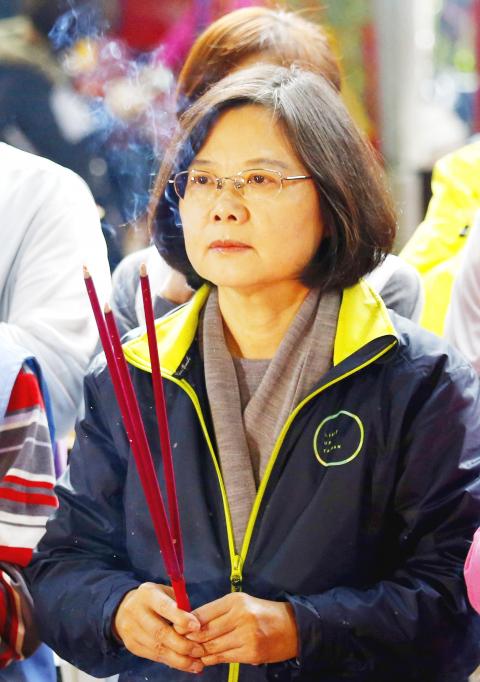Democratic Progressive Party (DPP) presidential candidate Tsai Ing-wen (蔡英文) yesterday urged the Mainland Affairs Council (MAC) to provide a detailed explanation of China’s limited transit flight proposal.
“Issues regarding cross-strait exchanges should be subjected to full-scale negotiations. I would take them in my stride if they have been through a democratic procedure and handled with equality and dignity,” Tsai said on the sidelines of a Taipei campaign event for DPP legislative candidate Rosalia Wu (吳思瑤).
If other matters were involved in the negotiations on the transit plan, the council should provide the public with a detailed account of the negotiations, she said.

Photo: Wally Santana, AP
Xinhua news agency on Tuesday carried an announcement from China’s Taiwan Affairs Office that residents of three Chinese cities — Chongqing, Kunming and Nanchang — would be allowed to transit through Taiwan Taoyuan International Airport for flights to a third nation, although a starting date was not given.
The council hailed the announcement as the result of President Ma Ying-jeou’s (馬英九) meeting with Chinese President Xi Jinping (習近平) in Singapore on Nov. 7 last year, and said it hoped the plan would be expanded to cover all Chinese travelers in the near future.
Asked whether the timing of China’s announcement was suspicious, coming so close to the presidential and legislative elections, Tsai said: “I will treat the matter with an ordinary mind.”
Cross-strait negotiations on the transit issue had been dragging, reportedly due to Beijing’s insistence that Taipei allow Chinese airlines to fly over the midline of the Taiwan Strait in return for a deal on Taoyuan transits.
Turning to the reported disappearances of five men associated with a Hong Kong-based publishing house, Mighty Current (巨流), known for books critical of the Chinese Communist Party leadership, Tsai said the Hong Kong and Chinese governments should give the public a clear explanation of what has happened to the men and adopt concrete measures to ensure freedom of speech for Hong Kong residents.
The disappearances have triggered protests in Hong Kong, as it is widely believed that the five might have been seized by Chinese law enforcement agents, as the publishing house is reportedly scheduled to release a book about a former girlfriend of Xi’s.
“This case concerns freedom of expression, which is highly valued by Taiwanese, because Taiwan went through a very difficult period to win our freedom of speech,” Tsai said.
Tsai said the nation’s history has made Taiwanese particularly concerned about whether freedom of speech is protected in other areas and countries.
Freedom of speech is a universal value, Tsai said.

SECURITY: As China is ‘reshaping’ Hong Kong’s population, Taiwan must raise the eligibility threshold for applications from Hong Kongers, Chiu Chui-cheng said When Hong Kong and Macau citizens apply for residency in Taiwan, it would be under a new category that includes a “national security observation period,” Mainland Affairs Council (MAC) Minister Chiu Chui-cheng (邱垂正) said yesterday. President William Lai (賴清德) on March 13 announced 17 strategies to counter China’s aggression toward Taiwan, including incorporating national security considerations into the review process for residency applications from Hong Kong and Macau citizens. The situation in Hong Kong is constantly changing, Chiu said to media yesterday on the sidelines of the Taipei Technology Run hosted by the Taipei Neihu Technology Park Development Association. With

CARROT AND STICK: While unrelenting in its military threats, China attracted nearly 40,000 Taiwanese to over 400 business events last year Nearly 40,000 Taiwanese last year joined industry events in China, such as conferences and trade fairs, supported by the Chinese government, a study showed yesterday, as Beijing ramps up a charm offensive toward Taipei alongside military pressure. China has long taken a carrot-and-stick approach to Taiwan, threatening it with the prospect of military action while reaching out to those it believes are amenable to Beijing’s point of view. Taiwanese security officials are wary of what they see as Beijing’s influence campaigns to sway public opinion after Taipei and Beijing gradually resumed travel links halted by the COVID-19 pandemic, but the scale of

A US Marine Corps regiment equipped with Naval Strike Missiles (NSM) is set to participate in the upcoming Balikatan 25 exercise in the Luzon Strait, marking the system’s first-ever deployment in the Philippines. US and Philippine officials have separately confirmed that the Navy Marine Expeditionary Ship Interdiction System (NMESIS) — the mobile launch platform for the Naval Strike Missile — would take part in the joint exercise. The missiles are being deployed to “a strategic first island chain chokepoint” in the waters between Taiwan proper and the Philippines, US-based Naval News reported. “The Luzon Strait and Bashi Channel represent a critical access

Pope Francis is be laid to rest on Saturday after lying in state for three days in St Peter’s Basilica, where the faithful are expected to flock to pay their respects to history’s first Latin American pontiff. The cardinals met yesterday in the Vatican’s synod hall to chart the next steps before a conclave begins to choose Francis’ successor, as condolences poured in from around the world. According to current norms, the conclave must begin between May 5 and 10. The cardinals set the funeral for Saturday at 10am in St Peter’s Square, to be celebrated by the dean of the College